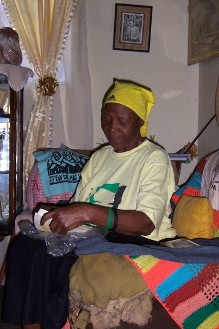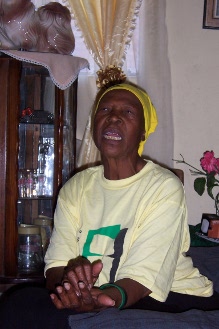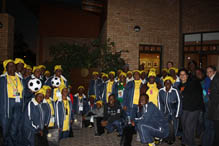
Angelinah Hlophe looks through old photographs
August 9, 2010 –Angelinah Hlophe, one of the “Gogos for Mandela”, a group of South African grannies between the ages of 49 and 84 who have their own football league in Limpopo, recalls participating in the women’s march on the Union Buildings in 1956.
In an interview with Nelson Mandela Foundation staff at her home in Nkowankowa, Limpopo on August 1, 2010 she told of her experience that day.
Hlophe’s mother was part of a group of women who set out very early in the morning to join the march against the extension of pass laws to women. “We walked to the Union Buildings from Mamelodi,” she recalls, a walk of about 18 kilometres.
On August 9 in 1956, some 20 000 women from across South Africa gathered at the Union Buildings to hand over a petition, demanding the abolishment of the pass laws, to Prime Minister Strydom.
At the Union Buildings, the women sang “Strydom, Wanthint’ abafazi, wathint’ imbokodo” (“Strydom, you strike a woman, you strike a rock”). After the 1994 democratic elections, August 9 was declared a public holiday, and National Women’s Day is now celebrated annually.
Hlophe, who was born on September 4, 1940, and grew up in Mamelodi, Pretoria, remembers that all the youngsters who had joined in the march waited at the bottom of the lawns while their mothers marched up the steps to the offices of the prime minister. She recalls how she knew at the time that this was part of the struggle against apartheid.
She remembers that, after the banning of the ANC and other organisations, her older brother, Johannes Kothope Mofokeng, used to disappear at night. She would see lights in the mountains near Mamelodi and wonder what her brother was up to.
In April 1961, her brother was arrested, severely tortured and then charged for his political activities. He was sentenced and imprisoned on Robben Island for around four years. For many years, the family had no news of him, received no letters and could not afford to visit him.
In 1965, the family suddenly received a letter informing them that he had passed away. They were in shock. It was only in 1969 that they learnt from Mofokeng’s co-accused, Ananias Chiloane, that he was alive and that it was another Johannes Mofokeng who had died.
Hlophe was forced to leave school in Grade 6 after her father died. She became a domestic worker and then moved to Nkowankowa with her husband.
In 2007, she started playing football for Vakhegula Football Club, affectionately known as “Gogos for Mandela”. She was part of the team that went to the United States to take part in a veteran soccer tournament in Massachusetts from July 10 to 14, 2010. This team visited the Nelson Mandela Foundation on their return from the USA on July 18, 2010.

